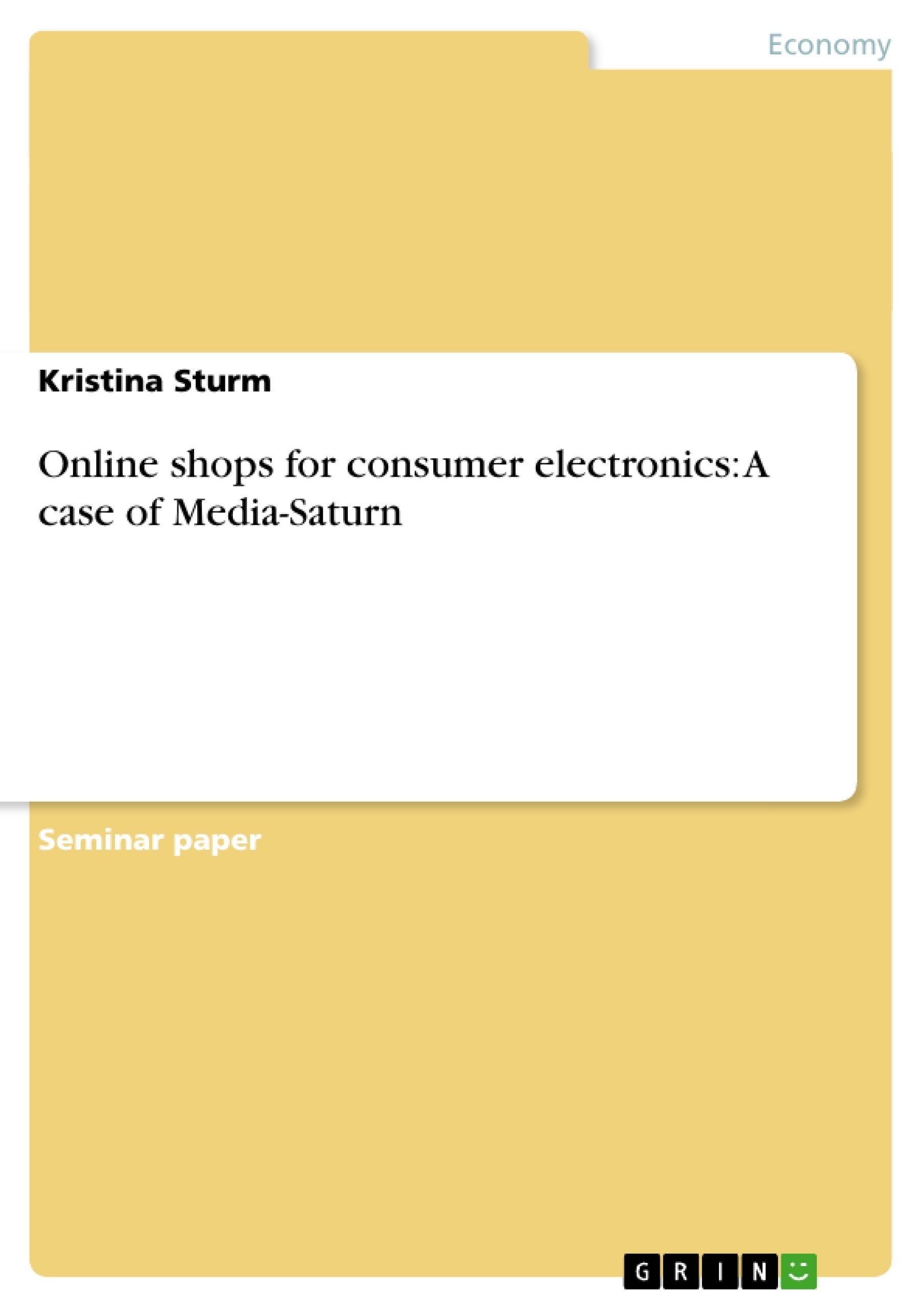The dissemination of the internet has had a large impact on business and has created new opportunities for companies. It has opened new distribution channels for both business-to-business (B2B) and business-to-consumer (B2C) products and services. Around the year 2000 a lot of new ventures were founded but also soon disappeared when the "dot-com bubble" burst. The remaining companies in the market however had time to expand their business at a steady pace. B2C online retailing is growing with the dissemination of broadband access (Schneider, 2011).
Inhaltsverzeichnis (Table of Contents)
- Electronic Commerce as a New Sales Channel
- Business-to-Consumer Retailing
- Market Participants in Electronic Business
- Online Retailing in Germany
- The Consumer Electronics Market in Germany
- Consumer Electronics' Competitive Analysis
- Entry barriers
- Power of Suppliers
- Power of Buyers
- Threat of Substitutes
- Rivalry
- Opportunities for Traditional Outlets
- Threats to Traditional Outlets
- Case Study: Media-Saturn Holding
- Internal Analysis of Media Markt
- Strengths
- Brand Reputation
- Localisation
- Touch-and-Feel-Effect
- Weakness
- Advertising Strategy
- Position of Competitors
- Integrating an Online Shop
- References
- Bibliography
Zielsetzung und Themenschwerpunkte (Objectives and Key Themes)
This paper explores the impact of online retailing on the consumer electronics market in Germany, specifically focusing on the case of Media-Saturn Holding. The author aims to analyze the opportunities and challenges for traditional retailers in the face of growing online competition.- The rise of electronic commerce and its impact on traditional retail models
- The competitive landscape of the German consumer electronics market
- The strategic considerations for traditional retailers integrating online sales channels
- The specific case study of Media-Saturn Holding and its challenges in the online environment
- An assessment of the strengths and weaknesses of Media Markt in the context of online competition
Zusammenfassung der Kapitel (Chapter Summaries)
- Electronic Commerce as a New Sales Channel: This chapter introduces the concept of electronic commerce and its impact on both business-to-business (B2B) and business-to-consumer (B2C) markets. It highlights the emergence of online retailing as a new distribution channel and the growth of B2C online retailing due to the widespread adoption of broadband access.
- Business-to-Consumer Retailing: This section delves into the specifics of B2C online retailing, noting the significant growth of online sales in Germany. The chapter compares online shopping to traditional mail order business and discusses how established mail order companies have successfully integrated online channels into their strategies. The author also examines the fragmentation of the online consumer electronics market and the presence of various online retailers, including pure online players like Amazon and eBay, as well as smaller electronics retailers.
- Market Participants in Electronic Business: This chapter classifies different types of internet business models, ranging from traditional companies using the internet as an extension to their existing businesses to companies fully dependent on the internet for their operations. The chapter also differentiates between "pure e-business" and "click-and-mortar" businesses, highlighting the challenges faced by traditional companies in balancing their sales channels to avoid cannibalization.
- Online Retailing in Germany: This chapter provides a detailed analysis of the online retail market in Germany, including data on total online sales and the dominance of the fashion retail sector. The chapter discusses the reasons for traditional retailers losing market share and the need for them to establish their own online shops to regain lost revenue. The author highlights the competition between online shops and pure online retailers, as well as the role of search engines and shopbots in attracting customers to online retailers.
- The Consumer Electronics Market in Germany: This section focuses on the specific market for consumer electronics in Germany, highlighting its importance in the online retail landscape. The chapter provides data on the ten largest online shops in Germany in 2008, showcasing the prominence of consumer electronics among their offerings. The chapter also presents statistics on the importance of consumer electronics as a product category in online sales, demonstrating its significance for the overall online market.
Schlüsselwörter (Keywords)
The key themes and concepts explored in this paper include electronic commerce, online retailing, consumer electronics, traditional retail, online competition, click-and-mortar businesses, strategic considerations, market fragmentation, online shop integration, and the case study of Media-Saturn Holding in Germany.Frequently Asked Questions
How has e-commerce affected consumer electronics in Germany?
E-commerce has opened new distribution channels, leading to significant growth in B2C online retailing and creating intense competition for traditional brick-and-mortar stores.
What are the strengths of Media Markt in the face of online competition?
Key strengths include brand reputation, localization, and the "touch-and-feel effect," allowing customers to experience products physically before buying.
What are "click-and-mortar" businesses?
These are traditional companies that integrate online shops with their physical outlets, attempting to balance both channels to avoid cannibalization.
Who are the main online competitors in the German electronics market?
The market includes pure online players like Amazon and eBay, as well as specialized smaller retailers and the online arms of traditional chains.
Why did Media-Saturn wait to integrate an online shop?
The case study explores the internal analysis and strategic challenges Media-Saturn faced, including their advertising strategy and the positioning of their competitors.
- Citar trabajo
- Kristina Sturm (Autor), 2011, Online shops for consumer electronics: A case of Media-Saturn, Múnich, GRIN Verlag, https://www.grin.com/document/189552



